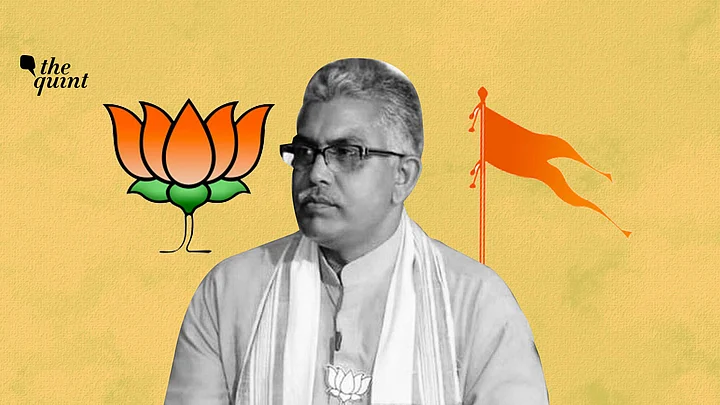West Bengal BJP Chief Dilip Ghosh recently courted controversy after he said that state governments should shoot down those damaging public property “like dogs”, as was “done by the BJP governments in Uttar Pradesh and Assam”. While Ghosh’s comment received widespread condemnation (even from the BJP), observers of West Bengal politics would attest to the fact that this is not the first (and will certainly not be the last) time that Ghosh has made such vitriolic comments.
In the five years that Ghosh has been President of the Bengal BJP, he has put his foot in his mouth several times. However, many believe that given Ghosh’s background, his elevation to the presidential post is served by his comments. Let’s take a look at how Ghosh was co-opted by the Bengal BJP, and whether his comments should be forgotten as “one-offs” or be taken seriously.
RSS Man Loaned to BJP
Much of Ghosh’s early life, like that of his boss, Narendra Modi, seems to be shrouded in mystery. Multiple sources on the internet reveal that he was born in Bengal’s West Midnapore district in a village called Gopivallabhpur.
In his 2016 election affidavit, Ghosh had claimed that he had received a diploma in engineering and technology from a polytechnic institute in Jhargram.
However, in 2017, this claim was contested by an RTI filed by an expelled leader of the BJP. It turns out that there is just one polytechnic institute in Jhargram and in the response to the RTI filed, the said institute – Ishwar Chandra Vidyasagar Polytechnic – said that Ghosh did not ever secure a degree from them.
In 1984, Ghosh joined the RSS and was soon made in charge of the organisation in the Andaman and Nicobar Islands. During this time, he also worked closely with then RSS Chief KS Sudarshan, which brought him recognition within the RSS in Bengal and also got him noticed by the BJP.
But how did this transition from a RSS pracharak to BJP chief come about?
According to Jawhar Sircar, political analyst and ex-bureaucrat, who served as Chief Electoral Officer for West Bengal between 1997 and 1999, and has seen political leaders very closely, Ghosh’s transition to the BJP coincided with the BJP’s transition from the Vajpayee mode of politics to the Modi mode of politics in 2014.
“In the 1990s and the early part of this century, the BJP in Bengal, though right-wing, had a lot of “bhadraloks” in its folds like Colonel Bagchi, Tapan Sikdar and barrister Satyabrata Mookherjee. Maybe even Rahul Sinha would qualify. They were right-wing but their demeanour did not set them apart from the dhoti-clad bhadraloks of the Left. They were a part of Bengal’s politics dominated by the “bhadralok” class. Since this did not yield the desired political dividends, the BJP shifted from being a mainly right-wing party to an extreme Hindutwavadi party. They needed a street-fighter. A man who is not a part of the bhadralok clan, and hence Ghosh was deputed by the RSS.”Jawhar Sircar to The Quint
He further adds that it was known to the party high-command that Ghosh was not a politician but a pracharak. However, the say-what-comes-to-mind attitude that has landed him in controversy today, is exactly the kind of aggression they were looking for to lead the Bengal BJP.
Ghosh was roped in as the state’s General Secretary for the party in 2014 and then made President in 2015.
Can a Controversial Leader Be BJP’s CM Face in Bengal?
Ghosh’s tryst with controversial and vitriolic statements goes as far back as his career as a politician.
Only last year he said that foreign cows are “aunties”, while Indian cows are mothers whose urine has gold. The same year, he also said that his party created controversies because the media looks for news. Before that, he called for a “surgical strike” on Kolkata’s Jadavpur University, calling it a “hub of anti-nationals”. He has also criticised “intellectuals” for eating beef on the streets of Kolkata and asked them to “eat dog meat at home instead”.
But do these statements, many of which other members of the BJP distanced themselves from, disqualify Ghosh as a possible chief ministerial candidate for the 2021 West Bengal state elections?
“No”, says Jawhar Sircar.
“While the hierarchies in the West Bengal BJP are largely controlled by Delhi, one must understand that a character like Ghosh is what gives the BJP political mileage. They tried having timid characters like Fadnavis and ML Khattar in chief ministerial posts. But that backfired. The people who work in their favour in terms of optics are people like Yogi Adityanath. Ghosh fits the same bill.”
Sources in the BJP too attest to a large portion of the party cadre being aligned to Dilip because of his RSS credentials. They also say that the party’s Bengal unit is still largely run under the directions of the RSS.
“While there are many who may seem ‘more suited’ to become chief minister from the Bengal BJP, Dilip Da holds a lot of sway because of his RSS background. Honestly, the party is still unclear on who to push as the CM face in 2021, but of the names doing the rounds, Dilip Ghosh is definitely one”, said a source.
So, to answer the question raised previously in this article, can we let go of Ghosh’s statements as one-offs by a fringe leader? Well no, for two reasons:
- He runs the state unit of India’s largest party in one of the country’s largest states
- And, he might soon, or is touted to, hold one of the most important constitutional positions in the country
What does that say about the BJP in Bengal? Not anything positive, for sure. But as of now, while you may hate or admonish Dilip Ghosh, it will be foolish to ignore him.
